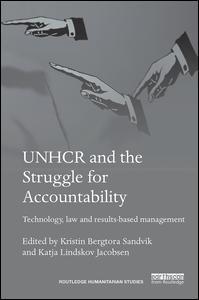Description
UNHCR and the Struggle for Accountability
Technology, law and results-based management
Routledge Humanitarian Studies Series
Coordinators: Sandvik Kristin, Jacobsen Katja
Language: English
Subjects for UNHCR and the Struggle for Accountability:
Keywords
UNHCR Accountability; Afghanistan; UNHCR Staff; Colombia; UNHCR’s Mandate; EU; UNHCR’s Relationship; Mauritania; UNHCR Statute; Morocco; UNHCR’s Effort; Turkey; IDP Protection; Uganda; RBM; anthropology; Internal Displacement; donors; Downward Accountability; governments; Biometric Registration; history; UNHCR Activity; humanitarianism; UNHCR Executive Committee; international law; UNHCR’s Response; international relations; UNHCR’s Work; Katja Lindskov Jacobsen; UNHCR’s Ability; Kristin Bergtora Sandvik; UNHCR Operation; Niamh Kinchin; UNHCR Resettlement; Maja Janmyr; UNHCR Staff Member; Adèle Garnier; UNHCR Field Office; Miriam Bradley; UNHCR’s View; Marion Fresia; UNHCR’s Director; Andreas von Känel; UNHCR Role; Ashley Brooke Rockenbach; UNHCR Official; Biometric Refugee
Publication date: 12-2017
· 15.6x23.4 cm · Paperback
Publication date: 02-2016
· 15.6x23.4 cm · Hardback
Description
/li>Contents
/li>Readership
/li>Biography
/li>
Despite the key importance of accountability for the legitimacy of humanitarian action, inadequate academic attention has been given to how the concept of accountability is evolving within the specific branches of the humanitarian enterprise. Up to now,there exists no comprehensive account of what we label the 'technologies of accountability', the effects of their interaction, or the question of how the current turn to decision-making software and biometrics as both the means and ends of accountability may contribute to reshaping humanitarian governance.
UNHCR and the Struggle for Accountability explores the UNHCR's quest for accountability by viewing the UNHCR's accountability obligations through the web of institutional relationships within which the agency is placed (beneficiaries, host governments, implementing partners, donors, the Executive Committee and UNGA). The book takes a multidisciplinary approach in order to illuminate the various layers and relationships that constitute accountability and also to reflect on what constitutes good enough accountability.
This book contributes to the discussion regarding how we construct knowledge about concepts in humanitarian studies and is a valuable resource for academics, researchers and professionals in the areas of anthropology, history, international relations, international law, science, technology studies and socio-legal studies.
Introduction 1. UNHCR and the Quest for Accountability 2. Accounting for the Deficit: Refugee protection, bureaucratic order, and UNHCR assistance in Uganda, 1959-66 3. Asylum making: the every-day practice of refugee status determination within UNHCR 4. UNHCR’s Human Rights Obligations: Applying the International Law Commission’s Articles on the Responsibility of International Organizations 5. IDP protection by UNHCR in Colombia 6. Narratives of accountability in the UNHCR's refugee resettlement strategy 7. UNHCR Reforms Revisited: Rights-based versus Results-based 8. UNHCR, Biometric Refugee Registration and Implications for Accountability Conclusion. The Future of Accountability
Kristin Bergtora Sandvik is a senior researcher at PRIO and the director for the Norwegian Centre for Humanitarian Studies, Norway. She holds an SJD from Harvard Law School (2008).
Katja Lindskov Jacobsen is assistant professor at Metropolitan University College, Denmark and external lecturer at Copenhagen Business School, Denmark. She holds a PhD in International Relations from Lancaster University (2011).




